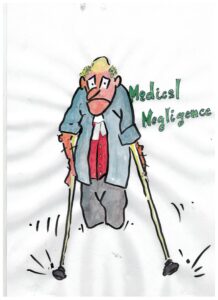Updated product safety mandatory reporting guidance for suppliers now available
- 2021-12-17
- By Dr Will Higgs PhD, Barrister
- Posted in Products Liability
Today the Australian Competition and Consumer Commission (ACCC) published its updated Mandatory Reporting Guideline to help businesses understand and comply with their mandatory reporting obligations.
The updated guideline also recommends voluntary reporting of incidents that do not meet the mandatory reporting requirements, such as near misses, to help provide the ACCC with an early indication of product safety issues.
Businesses can now find new mandatory reporting information and tools on the Product Safety Australia website, including a:
- quick guide that summarises obligations, making it easier for businesses to understand what they must do
- template notice that suppliers may use to help inform staff about processes for mandatory reporting
- questionnaire to help businesses ask relevant questions when reporting an incident
- flowchart to determine if an incident must be reported
Why mandatory reporting is important to your business
Businesses must submit a mandatory report when they become aware that the use or foreseeable misuse of a consumer product they have supplied has caused, or may have caused, a death, serious injury or illness.
Mandatory reporting of deaths or serious injuries or illnesses from consumer products or product related services also helps the ACCC identify emerging hazards and risks, so action can be taken to prevent similar injuries, illnesses, or fatalities.
Mandatory reports are confidential and are not an admission of liability. However, if a business does not submit a mandatory report, where a report is required, they may be found guilty of a criminal offence and need to pay either $3,330 for an individual or $16,650 for a body corporate.
Your obligations
Businesses must submit a mandatory report within 2 days if they become aware that the use, or foreseeable misuse, of a consumer product they have supplied caused, or may have caused, a death or serious injury or illness. They can do this by using the ACCC online mandatory reporting form.
Businesses required to report
All businesses in the supply chain of a consumer good or product related service must submit a mandatory report. This includes businesses who install, import, manufacture, retail, clean, repair or assemble consumer goods.
Reporting to another agency
In some limited circumstances, businesses do not need to submit a mandatory report if they are required to report the incident to another specialist safety agency. This includes road vehicle accidents, deaths reported to a coroner, food-borne infectious diseases, and incidents involving agricultural and veterinary chemicals.
Voluntary reports
When a business assesses that a mandatory report is not required, we recommend that they submit a voluntary report to help the ACCC monitor potential safety risks and trends to prevent a death or serious injury or illness.
This includes reporting incidents that could have caused a death or serious injury or illness but, on this occasion, did not, for example:
- a near miss
- a serious injury or illness that developed slowly over time and is not acute
- a pre-existing condition contributed to the death or serious injury or serious illness
- the serious injury or illness was treated by someone who is not a medical doctor or a nurse, such as a dentist or physiotherapist
- the incident was caused by the consumer good being misused in an unforeseeable way.
Advice for consumers
The ACCC encourages consumers to contact the business in the first instance to report a death or serious injury or illness caused by a consumer product. Consumers can also choose to report a product to the ACCC that they consider to be unsafe.
Background
This guidance material has been developed by the ACCC in response to stakeholder feedback seeking further guidance and practical examples to assist businesses to comply with their mandatory reporting obligations.
More information
SEARCH BLOG POSTS
LATEST BLOG POSTS
- Updated product safety mandatory reporting guidance for suppliers now available
- Pleading fraud – cause and effect is essential
- Does the Trustee’s right of indemnity have priority over the right of beneficiaries in relation to assets?
- Rules of war (in a nutshell) | The Laws Of War
- MH370 Final Report
Past Blog Posts
- December 2021
- September 2021
- August 2021
- May 2021
- April 2021
- March 2021
- August 2020
- February 2020
- September 2019
- February 2019
- December 2018
- July 2018
- April 2018
- December 2017
- May 2017
- February 2017
- December 2016
- November 2016
- October 2016
- September 2016
- August 2016
- April 2016
- March 2016
- October 2015
- September 2015
- August 2015
- May 2014
- April 2014
- March 2014
- January 2014
Categories
- Appeals
- Artificial Intelligence
- Aviation law
- Banking and Finance Law
- Blogs
- Civil Liability Act
- Class Actions
- Coding for lawyers
- common law
- Consumer Claims (TPA)
- Contract Law
- Contractual Interpretation
- Criminal law
- Deeds
- Docassemble
- duty of care
- Engineering Law
- Equity
- Evidence
- Exclusion Clauses
- Execution of documents
- Expert Witness
- featured
- Financial Services
- Fraud
- Fundraising (Chapter 6D)
- General comment
- Home Building Law
- Insurance
- Legal drafting
- Local Court
- Medical Negligence
- MH370
- Motor Accidents
- Negligence
- Occupiers negligence
- Other
- Personal Injury
- Personal Property Securities (PPSA)
- Pleading
- Practice & Procedure
- Products Liability
- Property
- Real Property
- Reasons for a decision
- Securitisation
- Security (Mortgages & Charges)
- Sentencing
- Swaps & Derivatives
- Teaching
- Transactional Law
- Transfer of financial assets in transactions
- Trusts & Trustee Law
- Uncategorized
- War and Weaponry
- Witnesses
SEARCH BLOG POSTS
LATEST BLOG POSTS
- Updated product safety mandatory reporting guidance for suppliers now available
- Pleading fraud – cause and effect is essential
- Does the Trustee’s right of indemnity have priority over the right of beneficiaries in relation to assets?
- Rules of war (in a nutshell) | The Laws Of War
- MH370 Final Report
Past Blog Posts
- December 2021
- September 2021
- August 2021
- May 2021
- April 2021
- March 2021
- August 2020
- February 2020
- September 2019
- February 2019
- December 2018
- July 2018
- April 2018
- December 2017
- May 2017
- February 2017
- December 2016
- November 2016
- October 2016
- September 2016
- August 2016
- April 2016
- March 2016
- October 2015
- September 2015
- August 2015
- May 2014
- April 2014
- March 2014
- January 2014
Categories
- Appeals
- Artificial Intelligence
- Aviation law
- Banking and Finance Law
- Blogs
- Civil Liability Act
- Class Actions
- Coding for lawyers
- common law
- Consumer Claims (TPA)
- Contract Law
- Contractual Interpretation
- Criminal law
- Deeds
- Docassemble
- duty of care
- Engineering Law
- Equity
- Evidence
- Exclusion Clauses
- Execution of documents
- Expert Witness
- featured
- Financial Services
- Fraud
- Fundraising (Chapter 6D)
- General comment
- Home Building Law
- Insurance
- Legal drafting
- Local Court
- Medical Negligence
- MH370
- Motor Accidents
- Negligence
- Occupiers negligence
- Other
- Personal Injury
- Personal Property Securities (PPSA)
- Pleading
- Practice & Procedure
- Products Liability
- Property
- Real Property
- Reasons for a decision
- Securitisation
- Security (Mortgages & Charges)
- Sentencing
- Swaps & Derivatives
- Teaching
- Transactional Law
- Transfer of financial assets in transactions
- Trusts & Trustee Law
- Uncategorized
- War and Weaponry
- Witnesses




